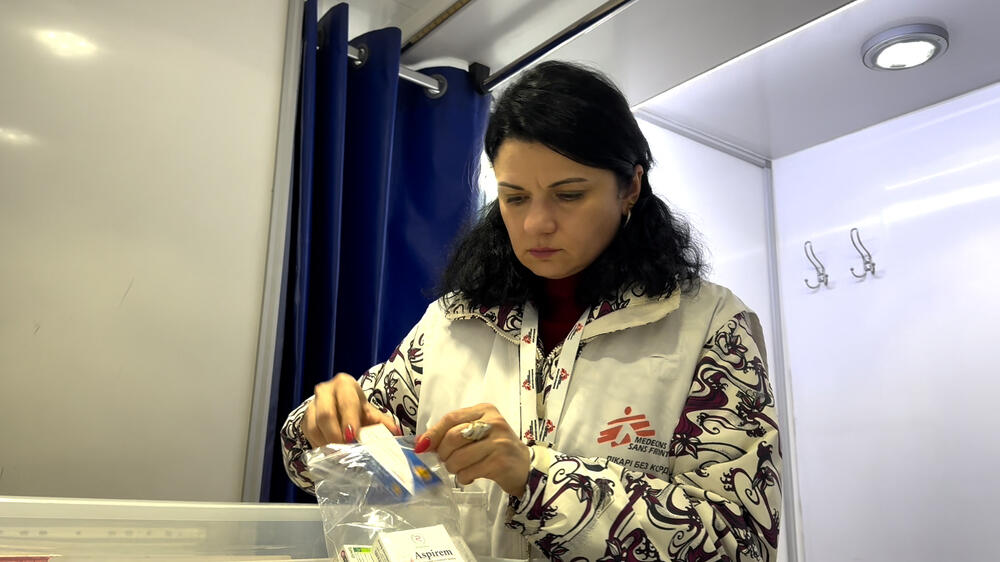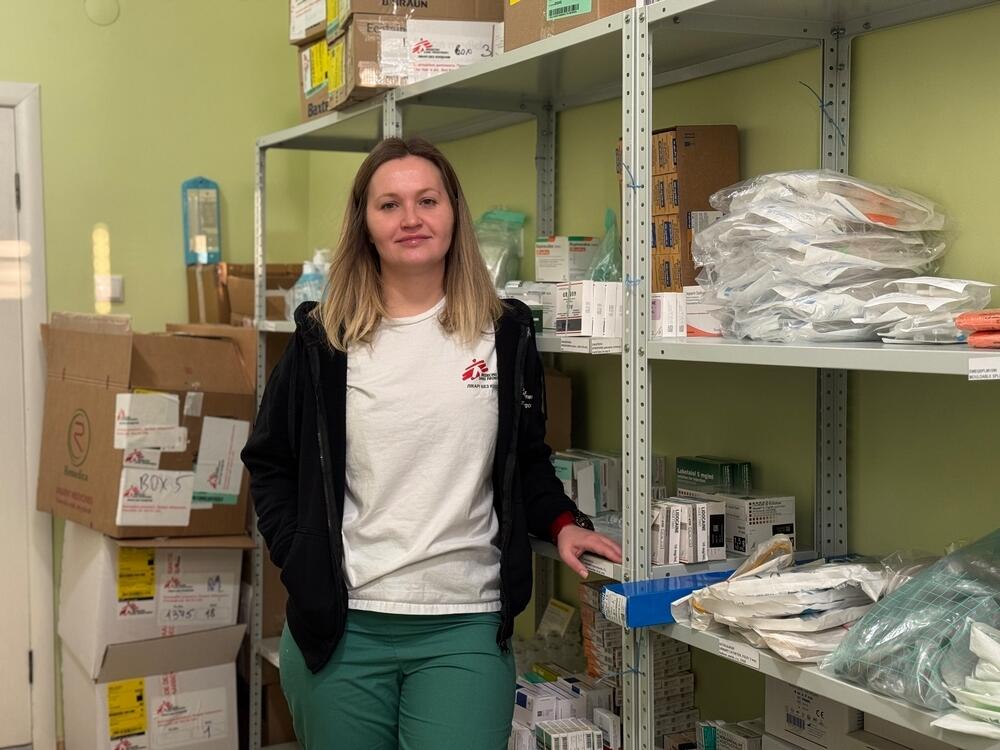Staff stories: Witnessing the impact of war in Ukraine
MSF Ukrainian staff remember the events of 2022 and the lasting impact as the war continues
“I had never seen such severe injuries before. But I knew I had to help”
Halyna Bekhovets, MSF nurse
“I woke up to loud explosions on the morning of 24 February 2022 in my home city of Rubizhne, Luhansk region. I was terrified. Each day, the fire and shelling intensified, and the frontline advanced relentlessly towards my city.
Four days later, I was sent home along with the other staff and patients at the rehabilitation center for veterans where I had been working as a state nurse.
By March, there was no electricity or water in Rubizhne. We couldn’t even step outside our building because the shelling was so intense.
…
On 21 March I fled with my family. The journey was incredibly dangerous due to constant shelling. We attached white flags—and any white fabric we could find—to our cars. Along the way, we witnessed many dead civilians in their vehicles. Thick black smoke filled the air, and ashes rained down on our cars; it was terrifying.
We arrived in the Dnipropetrovsk region, near the city of Kamianske, where local volunteers assisted my family in finding shelter. We were given a single room to accommodate the three of us and our dog.
However, I couldn’t sit idle for long—I needed to work. I started searching for a job and found an announcement stating that MSF was looking for nurses for its medical train. I applied right away.
With 15 years of nursing in an infectious disease hospital and four years in a rehabilitation centre, I had plenty of experience. They inquired how soon I could be in Lviv to join the MSF team and begin evacuating war-wounded patients by train. I was ready to go almost immediately.
I remember our first evacuations. The train transported children from Kharkiv to the safer western regions of Ukraine. One family had children with severe injuries—one had lost a limb due to a mine explosion, along with abdominal injuries and shrapnel wounds.
It was emotionally difficult for me, as I had never seen such severe injuries before. But I knew I had to help.
…
During my time with MSF, I participated in the response efforts in the recently retaken city of Kherson, located in southern Ukraine. Accompanied by the police, our team visited the city for the first time after its de-occupation.
Kherson was desolate, with very few residents remaining. We established medical consultations at the railway station, which was one of the safer locations in the city. Nearby, de-miners were working to clear the area of mines. They informed us that explosions might happen, so we wouldn’t be alarmed.
Many patients were suffering from trophic ulcers and old wounds. One elderly man had no dressing materials other than two bandages, which he rotated to dress his wounds himself.
I currently work on MSF's early rehabilitation project in Cherkasy. Our multidisciplinary team provides physiotherapy, nursing care, and mental health support. Every day, I encounter numerous patients with severe injuries who urgently need early rehabilitation.
They are all too familiar with pain. The war is far from over; I witness its consequences every single day.”
“People always say: ‘my home is my fortress’”
Nataliia Kelembet, MSF nurse
“I remember the day of the full-scale invasion vividly. At the time, I was working as the chief nurse in a hospital in Avdiivka, Donetsk region.
That morning my assistant was scheduled to receive a COVID-19 vaccination—as vaccination efforts were still actively ongoing.
At 6 am, while I was still in bed, she called me and said:
"Nataliia, what should we do? Should we still go for the vaccine? The war has begun."
I was in disbelief. "Tetiana, what war? Don’t be ridiculous. Of course, we have to go—we need to vaccinate people," I replied. She urged me to switch on the television.
It was only when I arrived at work and saw the bombed hospital that I fully grasped the reality. A full-scale war had begun.
…
Small groups of us huddled together in the offices, anxiously discussing what might happen next. We had already lived through the war in 2014, and we kept asking ourselves: how will this end?
People were too afraid to go outside. Only two shops remained open—for a city of 30,000 people. But fear kept people indoors.
At the hospital, we saw a surge in patients with hypertension, and many came simply to request medications, as nearly all pharmacies had shut down. Within days, those who could evacuate had left. Only the elderly and the most vulnerable remained, desperately seeking essential medicines, especially insulin.
Often, as we treated patients, shelling would begin, forcing us to flee to the basement. There was no electricity, no water, nothing—we worked by candlelight.
One evening, I came home and started washing the windows on my balcony. Suddenly, shelling began. I have no idea how I managed to run to the corridor in time—but because I did, I escaped unscathed. A moment later, every single window shattered. The glass I had just cleaned was gone.
…
I first saw MSF in Avdiivka working in frontline areas, bringing medical care to people in desperate need, despite the constant danger. I was moved beyond words. These doctors don’t forget about people, even here, I thought. I knew then that I wanted to be part of this.
When the city lost all communications, I evacuated to Sloviansk with my parents. Our hospital had shut down, and for a while, I stayed at home. But I kept searching for a way to help people, to make myself useful. I had lived through what so many others were now experiencing—I understood their pain.
Now, with MSF, I travel with a family doctor or a gynaecologist, running mobile clinics across Donetsk and Dnipropetrovsk regions. Our main patients are elderly people who have stayed behind in frontline towns.
In Pavlohrad, we treat patients evacuated from frontline cities. I’ll never forget one day in particular—an evacuation from Kostiantynivka.
We received seven wounded patients with shrapnel injuries. Their wounds were a day or two old—they had delayed leaving, even though they were injured. Why? Because, as people always say: “My home is my fortress.”
Listening to their stories was heart-breaking. I understood them completely—I also want to go home. But I know I never will. There is no home anymore.”
“This situation creates a kind of hardening but I always try to listen, not just prescribe medication"
Olha Severyn, MSF anaesthesiologist
“I was working in Dnipro when the shelling began across the country. I never considered leaving Ukraine. I knew I was needed here.
Within my team, we discussed the situation, especially those whose families lived near the Russian border where the frontline was forming. I was deeply worried because my parents were closeby.
Of course, I called and begged them to leave, but like many of their generation, they refused. It was their home.
From 25 February to 7 March, I lost all contact with them. I was terrified. I knew there were active hostilities, but I was powerless, stuck in Dnipro. Then, on 7 March, while on duty, my mother called to say they had left. I knew it must have been serious if they had abandoned their home.
They later told me that on 5 March, a shell had exploded in front of their building, blowing out all the windows. They had been in the basement at the time, but still felt the force of the blast. They fled with nothing but their documents. Their only thought was survival.
…
Now, looking at photos of their home is painful. The building still stands, but the fifth floor is gone. Recent shelling destroyed the windows and balconies. That was my home too.
Even though I left at 18 to study in Dnipro, I always returned. I remember summers when my mother’s roses bloomed, filling the air with their scent. But I doubt the city will ever be restored to what it once was.
For my parents, it’s even harder. They spent a lifetime building a home, and now, in old age, they are without work, without security, without a place to return to - like so many others.
That’s why I understand my patients in Kherson so well. Most are elderly, left behind with no family, no home, and no means to leave. They rely on our care.
There are few young people left in Kherson, and although we see some war-wounded patients, but the majority of our patients come with chronic medical conditions that have reached a critical and life-threatening stage.
…
I joined MSF in January 2024, but I already had experience with humanitarian organisations and war-related traumas. I was prepared for the unpredictable work. I wanted this experience.
Of course, working in a fully equipped hospital is easier, but right now, my skills are needed in places where resources are scarce. I value that MSF not only provides medical care but also essential supplies, which are in short supply here.
This situation creates a kind of hardening — one that affects not just our work, but also our daily lives. We must be prepared for various situations.
Every patient has a story of loss - loved ones killed, homes destroyed, families trapped in occupied territories by Russian military forces. I listen to all of them because I want to understand, not just treat.”
MSF in Ukraine
Médecins Sans Frontières / Doctors Without Borders (MSF) teams were already working in Ukraine before the escalation in February 2022.
From the first days of the crisis, we have worked to deliver emergency medical aid to people still in Ukraine, as well as those seeking safety in neighbouring countries.


